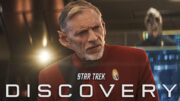With episodes 1 and 2 of Star Trek: Discovery fresh in our minds, the crew of USS TrekMovie’s Shuttle Pod podcast took to the podwaves to discuss the premiere of the brand new Star Trek show. In this new series, “Shuttle Pod At The Disco,” will cover each episode of Discovery just after it airs.
Subscribe to Shuttle Pod: The TrekMovie.com Podcast on iTunes, Google Play Music and Pocket Casts! Like what you hear? Please feel free to leave us a glowing review on iTunes.
Shuttle Pod At The Disco: Episode 1
In this, the maiden voyage of the Shuttle Pod At The Disco, Kayla, Matt, Brian, and Jared discuss “The Vulcan Hello” (written by Bryan Fuller and Akiva Goldsman, story by Bryan Fuller and Alex Kurtzman, directed by David Semel) and “Battle at the Binary Stars” (written by Aaron Harberts and Gretchen J. Berg, story by Bryan Fuller, directed by Adam Kane).
With this being a brand new show, there was a lot to unpack. In our hour-long discussion, we focused on our initial reactions to Discovery and looked at how well episodes 1 and 2 set up the rest of the series in terms of fan service, character development, world building, and how the new show fits into the pre-existing canon. Plus, we take a look at Star Trek’s first ever after show, After Trek, which Brian had the pleasure of attending in person in New York City.
At The Disco 1: “The Vulcan Hello” and “Battle At The Binary Stars”






Glad to see a lot of positivity among those first impressions.
It was a good discussion- good job. I Wish Kayla held her ground on how “life imprisonment” seemed ridiculously harsh for Starfleet. What popped in my mind was how this scene, with the “life imprisonment” and shadowy evil figures, reminded me of the Klingon court sentencing Kirk and McCoy in ST VI- not Starfleet.
My other thought actually questions the premise of the show (which I do like). It’s about the holograms. It doesn’t make sense to me that Sarek can just pop in across vast distances. Doesn’t it take time to send a message, even by “subspace”? That’s why Starship captains have to make decisions on their own at the frontier of space. In “Balance of Terror” Starfleet couldn’t respond to Kirk for three weeks. But if you can just call somebody and talk to them like Burnham called Sarek, where’s the drama? Moreover, why even limit yourself to your crewmates on your ship to work with and make decisions with? You can have a crew of holograms from anywhere in the galaxy all talking to each other in real time. It’s almost as stupid an idea as interstellar beaming in the JJ movies, which made the need for starships obsolete. This is almost as bad an idea.
“Doesn’t it take time to send a message, even by “subspace”? ”
I guess it doesn’t make for good TV having to watch whilst she waited for the phone to be picked up! It’s a bit like in STV – I don’t want to wait whilst they travel the months to the great barrier.
I understand the reasons for the ‘dark courtroom’ – it was to show how isolated the character was. A literal spotlight on her. I think the cliche worked, but it would’ve been better to show a proper court room – without smoke added for effect!
You comment about the dark, shadowy starfleet courtroom being like the Klingon court in STVI – I think it’s purposeful as to why the did that. Clearly the Starfleet ruling court was meant to be ominous.
Life imprisonment was harsh, but really one could argue Burnham’s actions led to the death of a renowned Captain, an Admiral, and a whole fleet of Federation ships.
In our own world, whistleblowers have been threatened with DECADES of jailtime for far, far less.
If you watch the beginning of the second part of The Menagerie in TOS, you see a dark background around Spock, and all of his guilty pleas. I feel like DISC was trying to emulate that, as she is essentially another child of Sarek.
Great observation!
Good point about the whistleblowers. Still (and I’ll have to watch the scene again), it seemed like Burnham was being sentenced for assaulting her Captain and mutiny, not for starting a war (which she arguably didn’t; the producers have stated themselves that will forever be an unanswered question). So however you rationalize it, the whole thing kind of makes you wonder: what did all those good people die defending, if criminal justice back home is so harsh?
That said, it’s great that Trek is once again promoting thoughtful debate. You sure didn’t get that with the Abrams movies.
Very much agreed with Starfleet standards of justice, which I’m guessing aren’t going to look very enlightened in the next episode either. I get that this is pre-TOS, let alone TNG, but still. “We don’t shoot first,” but a life sentence for a crime that falls well-short of murder? I’d like to question the producers on that one, that’s for sure.
(And yes, the trial certainly did have a Trek 6 vibe. But that was Klingons, for Kahless’ sake.)
I agreed with Kayla. The punishment for munity was harsh. I don’t know if they were going for a real world angle where munity is an offense punishable by death but lessened it to life. Either way I side with Burnham in the decisions she made and I wonder why Starfleet had no idea about the Vulcan Hello. I also didn’t think that Ro’s imprisonment was for life. I thought it was max 10yrs or something along those lines. It makes one wonder how the justice system works in Starfleet.
Some response to points raised in the discussion:
– the Burnham/Sarek katra / telepathic communication scene. I wondered if this was why Sarek gets Bendi syndrome in TNG. We saw long range telepathic communication between Vulcans as early as in The Immunity Syndrome. Also in the novelisation of TMP. Alternatively, maybe he’s an echo in her mind?
Another great point I hadn’t thought of. Man, people on this thread are in the zone today.
Wonder if it would have been cool if Sarek had noted that he was risking long-term brain damage by the use of such communication. Or, maybe too on-the-nose?
I love this
I liked the delta-in-the-sand scene. It was a nice metaphor for STAR TREK coming out of the wilderness after many years and returning to TV.
Not that anything gets resolved here, but I do want to make some points.
Not showing all the time on flight in a movie is a necessity or else the movie would last more than two hours (maybe weeks or more). That’s just common sense. But introducing a new technology where Starfleet crew on the edge of federation space can have “real time” communications compromises the whole idea of having ships out there on their own facing dangers. It is t just condensed storytelling. The idea of beaming people across the galaxy in the 2009 Star Trek movie was similarly frequently criticized, even in the “Disco” discussion this article refers to. Like the holograms, it renders the whole concept of starships, which is at the heart of StarcTrek, moot. I’m saying that being able to bring in any character via hologram to talk to, from anywhere, at a moments notice also goes against the basic framework of Trek.
As far as the courtroom scene, yes they were trying to seem ominous. But my point was there is something wrong when a Starfleet courtroom mirrors a Klingon court. It didn’t feel like the Federation to me.
The instantaneous communication doesn’t bother me too much. They were only a few light years from an Andorian colony, and they had an (albeit damaged) subspace buoy right in front of them. It’s never been clear how these things work.
I loved the two episodes that we’ve seen so far, but it would fit in a lot better if this were Kelvin timeline.
Although this is set in the Prime Timeline Brian Fuller said that it could easily fit in the Kelvin Timeline.
LOL, that’s the best podcast name you could come up with?
What would you suggest instead?
Great show with a whole spectrum of opinions–certainly, IMHO, a much more valuable use of my time than CBS’s “After Trek” show.
So Mr. Drew, based on your published reviews here and what we heard on the podcast, would it be fair to say that you’re preferring what you’ve seen on The Orville so far to Discovery? No judgements; I’m just genuinely curious.
Orville has been intriguing so far but I think it’s still trying to figure out what it wants to be. It’s a strange blend of comedy, drama, and Trek. Makes it hard to review, tbh.
I have several misgivings about Discovery, particularly it’s tone, but due to its serialized nature I want to let the story play out a bit before rendering a judgement.
Fair enough. I respect your opinion, and though I liked (with some pretty big caveats) the first two hours, I can certainly understand this show not being everyone’s cup of Earl Grey.
A pleasant podcast listening experience. You’re all very nice people and you know your trek. Still, I wish your panel represented a slightly broader range of opinions sometimes. Respectfully, it seems like you’re more committed to being fans of everything than to engaging at a critical level. That’s my problem with fandom in a nutshell, I guess. I imagine that I like some things because I think they are good, and that I reject some things because I think they are bad. It shouldn’t matter that it says it’s star trek, or whether it looks or sounds like star trek. The question should be whether it IS star trek, morally and philosophically.
And with respect to that, I don’t see how anyone could realistically say that it represents the spirit of star trek as this point, unless you’re also one of those people that can say Terminator 2 is movie about non-violence with a straight face, aka someone who is willing to disregard the whole content of the piece because of a tacked on message inbetween explosions. It seems we won’t really know, probably, until the midway break of this season what the actual content of the series will be. Will it be a series of semi self-contained stories exploring ethical issues and the wonders of space, or will it be, as it has been so far, a BSG style space military show with some throw away lines about exploration? I don’t know, and I am witholding judgement, I would much rather it be something I like rather than not, but I see little reason to be optimistic at this point. Sure, it was a good enough Star Trek / BSG hybrid, but those are not the same things. BSG was a war story. Star Trek, even DS9, has always been primarily about peace, not just in it’s stated philosophies, but in it’s actual content. Again, even DS9’s war arcs are not the majority of the series, and even if they were, DS9 is not above reproach.
Bottom line, although you’re all very nice and intelligent and knowledgable, but I still wish (as I have before) you guys would bring someone on who wasn’t so in love with everything, maybe who didn’t meet all the cast and who isn’t friends with Matt Mira and thus has to say nice things about his (really tacky) after show. But I suppose you’re aiming to be more of an enthusiasts podcast than a discussion podcast, and that’s fair enough, I suppose.
Any hardcore fans like me distracted by all the TNG-era bridge sound effects on the Discovery bridge?
I would welcome someone to please correct my confusion regarding what I’m reading in the comments below… re: shadowy tribunal resulting in “life in prison”.
First, maybe we are all jumping the gun because she’s on the bloody USS Discovery bridge in like 3 days from now.
But… assuming she received that actual sentence. It’s true… the tribunal is in exact opposition to what the Shenzou captain yaps about over and over that “Starfleet is all about”.
1. We are the “come in peace” Federation people.. BUT we put you in prison for life?… for TRYING to save the crew based on third-hand advice from Federation Ambassador Sarek????
2. It’s very clear that regardless of if Shenzou would’ve immediately fired, that there would be a “battle at the binary stars”. The Shenzou ended up NOT firing, and the Klingons still attacked the Europa and the Federation fleet UNPROVOKED.
3. And based on this, end result is Burham’s suggestion to fire first WOULD’VE been the correct choice. It was Michelle Yeoh’s poor decision making skills that led to so many casualties.
4. What am I missing? At what point did the Klingon ship CLOAK and no one noticed before it smashed the Europa?
5. This pilot completely reinforces the idea that the Klingons are an unreasonable warlike race. Klingons throughout all of Star Trek are ALWAYS purely evil and greasy villains. The only time they are “misunderstood warriors” are in behind-the-scenes DVD documentary discussions. But you cannot escape the pure fact that the Klingons are always written in episodes to be the ones who attack first and are utter hypocrites about their “honour”. Never do they actually act honourably. They are always stabbing each other in the back… LITERALLY. And this episodes just makes them even more of the sci-fi monsters lay-people perceive them to be.
If I understood correctly, I don’t think it would have gone any better if the Shenzhou had fired first. In fact, it would have turned out even worse. The Klingons were looking for a war, and nothing the Shenzhou did or didn’t do would have changed that. If the Shenzhou took Burnham’s advice and fired first, the Shenzhou would have been destroyed because there were all these other cloaked Klingon ships there and it would have been outgunned (that’s if I remember the timing of the scene correctly).
Secondly, sometimes in life you can make a decision and it turns out badly, but that doesn’t mean it was bad judgment. Good judgment doesn’t mean being omniscient and you are guaranteed to have a good ending. There had been no interaction with the Klingons in 100 years, so there just wasn’t enough information on them to know what to do. It was guesswork, no matter what the decision was. And now the Federation has learned what the Klingons can do. The idea of wisdom and good judgment is to keep learning from experience, not to always know in advance what to do.
Don’t take it from me, take it from him:
https://youtu.be/1TCX90yALsI
ST:EXP, my understanding is that the ship that decloaks and destroys the Europa was cloaked the whole time. It is NOT the ship that T’Kuvma was on. T’Kuvma called the ship his “Emissary.”
There is precedent for Vulcans communicating telepathically over light years. Spock was in some sort of communication with Vger and, likewise, Spock is instantly aware when the all Vulcan helmed Intrepid is destroyed in the Immunity Syndrome. Perhaps, telepathic ability runs in families and is particularly strong in Sarek’s line and Sarek being full Vulcan may well have even greater ability to communicate over time and space than Spock. I’m of two minds about the harshness of the sentence handed down to Burnham. On the one hand, she did commit mutiny and a la The Menagerie Starfleet does still have the death sentence so it seems that life imprisonment wouldn’t be completely out of left field in that context. On the other hand, Lenore Karidian committed multiple homicides and was just sent to a facility to wipe her memory of the events so she could lead a happy life unburdened by the memory of her crimes to which I’ve always kinda felt like WTF! This is justice in the 23rd century? On that note, though there didn’t seem to be any indication in the preview for next week’s episode the title does make me wonder if we’re perhaps in for a trip to Tarsus IV. I haven’t done the math so the dates may not work out on that but the title makes me wonder and I’ve always felt that that episode really had a lot of prequel potential.